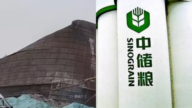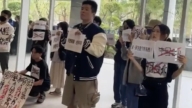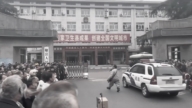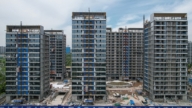【新唐人2011年12月8日讯】大陆法学界上个月在北京举行了一个研讨会,会上传出中共最高人民法院院长王胜俊罹患胰脏癌的消息。消息一传出,会场内却响起如雷掌声。外界认为,掌声代表某种民意,也折射出中国司法偏离后,很多人对中国司法改革不进反退的失望心情。
北京律师梁小军日前在微博上透露,京城司法界举行了一个冤案研讨会,会上有人提到最高人民法院院长王胜俊得了胰腺癌时,场上掌声雷动。
梁小军表示,王胜俊在执政期间,有好多案件经不起历史的考验。搞得民怨四起,所以掌声可能代表着一种民意。
北京律师梁小军:“因为当时旁听的,就是说在那开会的有很多是受害者的家属,是一个死刑案的受害者家属和定刑的受害者本人。然后等于他们经受了酷刑,然后又经过10多年的审判,就等于说是家破人亡、妻离子散那种。所以他们听到这个消息以后,他们可能是,就是感觉,就是一种受到迫害以后,他们感觉很解气,所以更多的掌声是由他们发出的。”
65岁的王胜俊是安徽人,合肥师范学院历史系毕业,曾任安徽省公安厅长,后调中央政法委任秘书长。2008年升任最高人民法院院长。
据了解,没有任何法律背景的他出任中共最高人民法院院长,令法学界哗然,加上他任职期间,司法改革不进反退,更受法学界诟病。
北京维权律师李和平表示,为什么那么多人听到这样一个消息的时候,大家竟然鼓掌,这值得思考。
李和平:“自从王胜俊院长当了法院院长之后,中国的司法是一种非常非常明显的这种,说倒退还不是,是偏离了法制的轨道,甚至说是一种背离。很多人对中国的法律很失望,对这个法制的这种破坏感到很痛心。那么就是说,他们就把这个责任归咎到王院长身上。都希望他,甚至就是按照中国的话,甚至就是盼望他早点离开。”
法学专家、北大教授贺卫方指出,王胜俊曾提出政法工作要坚持三个至上,他不强调依法,而强调政治,致使近几年,法院沦为当局维稳的工具。旧冤案得不到伸张,又出现大量新的冤案,导致访民如潮,民怨沸扬。
而自1999年江泽民发动的迫害法轮功以来,法院配合中共当局枉判法轮功学员的案例历历在册。《欧洲圆明网》报导,今年﹙2011年﹚6月27号星期一上午,常德市武陵区法院代替常德市中级法院转交一份判决书,没有庭审。7名法轮功学员被非法重判,他们是:刘先菊十年、王晓辉九年、李海军八年六个月、刘慧平七年六个月、曾丽华七年、满三清五年、陈陵慈三年。
浙江民主人士邹巍:“任何人,包括是法轮功啊什么的,都不应该因为自己的信仰、炼功遭到迫害,特别是国内的法轮功我们知道。据我了解的国内的法轮功(学员),我感觉到是所有人民最善良的群体。因为当初炼法轮功好多都是抱着强身健体,行善的这样一些人。所以我认为对那些法轮功这样善良的人视作敌人、打压迫害,这肯定是一种罪恶。”
也因此,贺卫方教授表示,一个完全不懂法律的人,去主管司法,这是中国司法的悲哀!
新唐人记者唐睿,孙宁采访报导。
Chinese Applaud CCP Supreme Court President’s Cancer
At a judicial seminar recently held in Beijing, news came out
about Wang Shengjun’s affliction of cancer.
Wang was the Pesident of the Supreme People’s Court of
Chinese Communist Party (CCP).
The seminar attendees gave thunderous applause to
the news.
Comments say the applause represents a kind of public opinion,
and also reflects that many people felt disappointed with
China’s judiciary deviating from the rule of law, and
retrogression in China’s judicial reform.
Beijing-based lawyer Liang Xiaojun revealed on his micro blog,
at a recent seminar on judicial injustice held in Beijing,
someone mentioned that the President of the Supreme
People’s Court, Wang Shengjun,
has contracted pancreatic cancer.
The news provoked a round of applause.
Liang Xiaojun comments, during Wang’s terms of office,
many cases of injustice have been generated,
which triggered widespread public discontent.
So the applause may represent a kind of public opinion.
Beijing-based lawyer Liang Xiaojun: “Because many of the
attendees to that seminar are families’victims of judicial injustice.
They are the families of a victim of a death penalty
case and the victim who receives a jail term.
Excruciating pain and 10 years of trial resulted in a complete
break-up of their families.
So I think when they heard the news,
they felt like venting their anger, thus more applause were given by them. “
65-year-old Wang Shengjun is from Anhui province,
a history graduate from Hefei Teachers College.
Wang was former chief of Anhui Province Public Security
Department.
Later, he was named as Secretary-General of the
CCP Central Politics and Law Committee.
In 2008, Wang Shengjun was promoted to the President of
the Supreme People’s Court.
hen Wang was appointed President of the Supreme
People’s Court,
China’s legal community voiced outcry,
since Wang has no prior legal background.
Wang’s tenure brought retrogression rather than progression
to China’s judicial reform, incurring more criticism by the legal sector.
Li Heping, rights lawyer in Beijing, believes that so many
People applauded such news, this is worth thinking about.
Li Heping: “Since Wang Shengjun became Supreme Court
President,
it can be seen very obviously that China’s judiciary veers off
the path over the rule of law, to be precise, that is a deviation.
Many people are disappointed with China’s laws,
they felt very sad about the ruining of the rule of law.
So they think Wang should assume the responsibility,
that is, they expect him to leave as soon as possible. “
Legal experts, He Weifang, a professor at Peking University,
said that
Wang Shengjun instructed the political and legal workers
to adhere to three priorities.
Wang never claimed ruling by law, but rather emphasized
ruling by politics.
This turned China’s judiciary into the CCP’s tool for stability
maintenance in recent years.
New cases of injustice have thus been massively generated
while piles of old ones remain unsettled, creating waves of petitioners
and growing civilian resentment.
Since Jiang Zemin launched the persecution of Falun Gong in
1999, China’s judiciary system has actively cooperated with
the CCP regime to make unjust judgments
over Falun Gong cases.
Yuanming.net reports that in June, Wuling District Court of
Changde city, without going through the trial process,
replaced Changde Intermediate People’s Court
to hand down a guilty verdict.
Seven Falun Gong practitioners were illegally sentenced
to labor camp: Liu Xianju: 7 yrs; Wang Xiaohui: 9 yrs;
Li Haiyun: 8 yrs; Liu Huiping: 7 yrs; Zeng Lihua: 7yrs;
Man Sanqing: 5 yrs; and Chen Lingci: 3 yrs.
Zou Wei (Zhejiang-based democracy activists):
“Nobody should be subjected to persecution for their beliefs.
Especially those Falun Gong practitioners, we all know they
are persecuted for their beliefs and practicing exercises.
My personal experiences tell me that Falun Gong
practitioners are a group of kind-hearted people.
Many of them began to practice Falun Gong only for gaining
health and becoming a better person.
Now the authorities view them as enemies and crack down on
them, I think this is certainly an evil act. “
Renowned legal expert and professor, He Weifang,
comments that a person without any legal knowledge could
be appointed head of the judicial system, that’s the real
tragedy of China’s judicial system!
NTD reporters Tang Rui and Sun Ning.





























